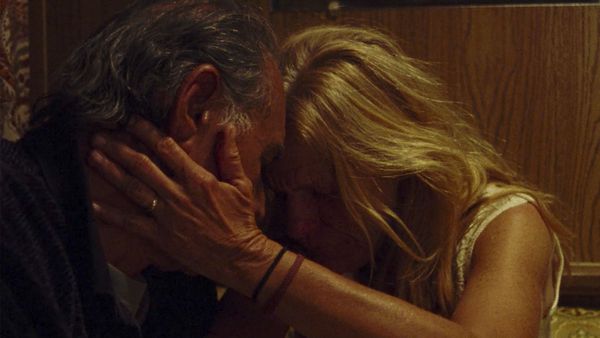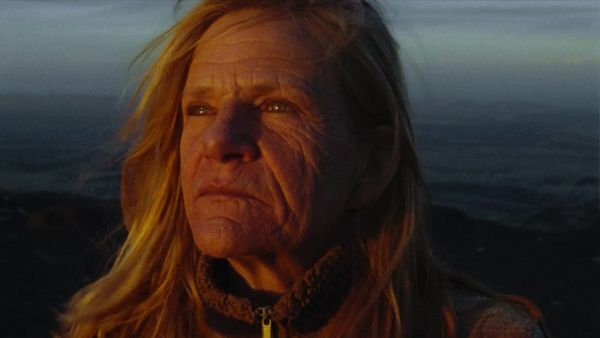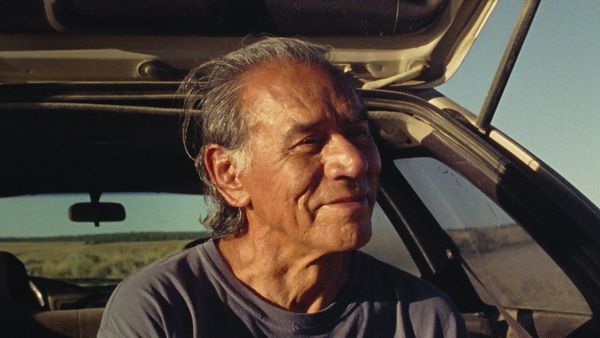 |
| Wes Studi and Dale Dickey in A Love Song. Max Walker-Silverman: 'The whole world of it is intended to work in such a way that very small things are truly monumental' Photo: Cow Hip Films |
We caught up to chat to the pair of them when the film, after its premiere in the Next section at Sundance Film Festival, played in the Panorama strand at Berlin. Silverman wrote the character of Faye with Dickey specifically in mind. He says: “Not only did I know that Dale could do it, I knew that probably there was no one else who could. And I had her in my head for this story long before I wrote the script. That was who I pictured writing every line in direction, which is a very strange intimacy to have with someone who you've never met. And maybe a jerk actually, which clearly couldn't be further from what ends up being the truth but it's just part of the strange process of the thing.
“She was a character that sits in so much silence and quiet. And I knew that it needed an actor who could fill that space, who could give life and emotion and bring a history to this little moment in time we drop in to spend with the character. And then Dale, from the moment I first saw her in film, I was just struck by the wonderful rare reality of seeing a real person who looked like came from my part of Colorado, from the mountains, and like the people who raised me and shaped me. And, who I just knew would exist so beautifully in the landscapes of my home. And despite those extremely high expectations, everything was exceeded, Dale brought not only the power I knew she would bring, but also a fragility that I don't think anyone has ever seen before. And it kind of took my breath away, take after take. And then, perhaps most importantly, just a remarkable generosity of spirit and a kindness. And that was so critical, because we were basically eight kids right out of film school in the middle of nowhere. And all we had was our kindness to each other out there. And Dale became the beating heart of all of that.”
The director says he also started thinking about Studi – a familiar face from the likes of Dances With Wolves and The Last Of The Mohicans – quite early in the writing process.
 |
| Max Silverman-Walker on Dale Dickey: 'Dale brought not only the power I knew she would bring, but also a fragility that I don't think anyone has ever seen before' Photo: Cow Hip Films |
“I don't think there's many first-time directors you get to work with people so legendary, and so experienced as I was able to, but that was the only way it was going to work with with these characters, was with actors who could bring so much experience and understanding of the world into these roles that I'd built the skeleton of, but were lacking flesh and blood and skin. And that's what, that's what Wes and Dale brought.”
Although the director talks about being “eight kids”, watching the film, it seems he’s an old soul, since he has chosen to pick much older protagonists for his film. “I think that's kind of just my community out there,” he says “You know, I’m not living in a big city surrounded by young people. I live in a small town and I see my parents frequently and their friends and, if you go to the bar, the people are older and if you go camping, the people at the campsite next to you are going to be older too. It just felt very natural and very true as to how this experience would be.” The film has a low-key vibe as we watch Faye go about her daily business of listening to bird song, catching crayfish and waiting for the post and the possibility of Wes Studi’s Lito turning up with his “big black lab”.
“The whole world of it is intended to work in such a way that very small things are truly monumental,” says Walker-Silverman “We shot it with a very small crew in a huge landscape. It's a story that follows two people, but is about the biggest questions that we all face. And part of that is the reality that sometimes huge discoveries can come in very modest ways, that the little things can have big changes. And in this case, it's a story about a character whose life will change completely due to the way her relationship with solitude shifts even slightly. It's not about solitude being something that has to be overcome. It's not about a victory. But it's about an extremely powerful little shift. And I think that that sort of duality runs through all aspects of the film and of the production.”
The quiet of the landscape is its own character in the film, which relies on much on listening as it does on words – whether it’s the birdsong that Faye wakes up to or the music that springs out when she twirls the dial of her radio. “The truth of it is there's no such thing as silence There's only sounds you didn't hear before. As her your life has grown more spare, it's also opened itself up to a gentle richness that most of us are not aware of, it's the birds and the stars. It's the rustling of the grass and the wind in the water. You know, that's not silence, it’s just sounds that most of us don't necessarily hear. So that's, that's kind of part of the beauty of the characters that through this strange process of, a minimised life, it's actually like opened up all these other things.”
The whole film was shot with a small crew in a Covid bubble, due to the pandemic, and Walker-Silverman says his experience of working with a tight unit of people on his small films helped. “We shot we shot this feature in the same way I'd shot my short films, almost literally, as far as the actual physical production went,” he says “The same crew the same location. A lot of the same actors had been in my short films. My parents helped on my short films and they helped on this one, our neighbours helped, the community did.
“We drove a camera out from Los Angeles the same way we did the short films, we drove some lights down from Denver, the same we did on the short films. We reused a lot of costumes from the short films. It was really very similar. And we were blessed with wonderful new friends along the way, like Dale, like Wes, like our producer, Dan Janvey, from Brooklyn, who understood the architecture of a feature in a broader way. But the other producer was Jesse Hope, who I grew up with in Colorado, and we did all the shorts with so, yeah, we basically just took everything we knew how to do shooting those short films and made the sucker longer.
“ I loved making those shorts and I love working Colorado the way we did. So it's, an incredible relief to see that maybe I can keep just keep doing that. And maybe I can actually start to pay people like a bit and maybe we'll be lucky enough to keep doing this for years. I really hope so.”
Sony’s Stage 6 Films has bought the rights to the film, with Bleeker Street distributing the film in the US - a release anticipated to be in late summer.






















